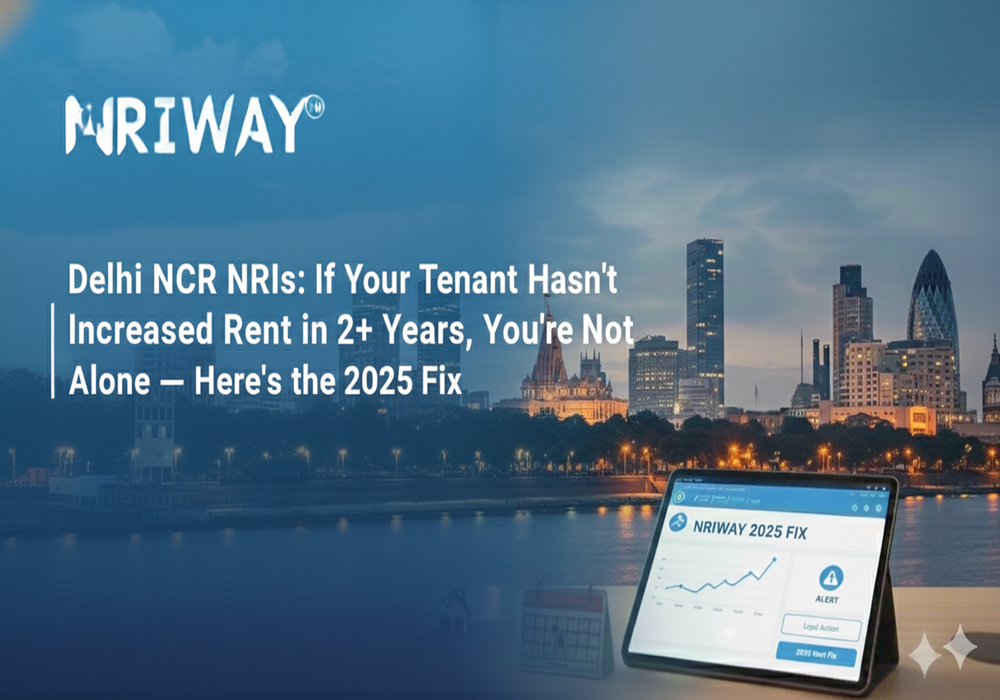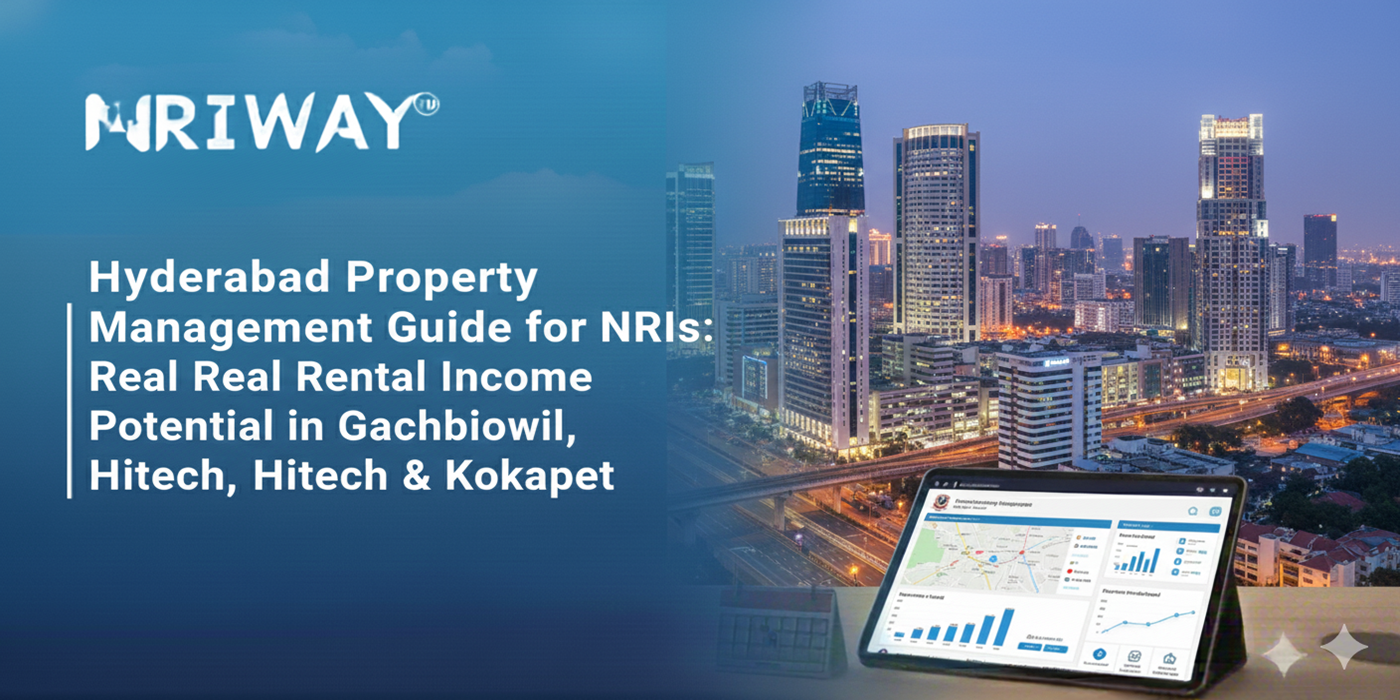Delhi NCR NRI Rent Stagnation 2025: How to Fix Issues

Delhi NCR NRIs: If Your Tenant Hasn't Increased Rent in 2+ Years, You're Not Alone — Here's the 2025 Fix |
Owning a property in Delhi NCR whether in Gurgaon, Noida, Dwarka, or Greater Kailash is both a valuable asset and a long-term emotional anchor for NRIs. But if your tenant hasn’t increased the rent in the last two or more years, you’re not alone. Thousands of NRIs are facing the same issue, especially with remote management challenges, society compliance rules, and lack of updated market data.
This guide breaks down the actual 2025 rental landscape in Delhi NCR, explains why tenants resist rent hikes, and gives you a clear, actionable plan to correct your rental income without creating conflict or risking vacancy.
1. Why Rent Hasn’t Increased for Many NRI Landlords (2022–2025)
Several NRIs report that tenants have continued paying the same rent since 2021 or 2022. Here’s why:
● Pandemic-era rent freeze
During the COVID period, rental markets softened. Many landlords agreed to freeze rents temporarily. However, most NRIs never revisited these old agreements.
● Tenants know you live abroad
Tenants often assume:
- You won’t check market rates
- You want “peace”
- You fear vacancy since you’re overseas
This leads them to resist rent negotiations.
● Poor tenant vetting and informal renewals
Many NRIs renewed leases informally via email or WhatsApp, with no clauses for annual escalation.
● Outdated rent expectations
The NCR rental market has changed massively between 2022 and 2025.
2. 2025 Rental Market Data for Delhi NCR (Fresh Stats You Can Use)
Gurgaon (Gurugram)
|
Locality |
2022 Avg Rent |
2024–25 Avg Rent |
Growth |
|
DLF Phase 5 |
₹50k–₹65k |
₹75k–₹1.1L |
25–40% |
|
Golf Course Road |
₹65k–₹90k |
₹95k–₹1.5L |
30–45% |
|
Sohna Road |
₹22k–₹33k |
₹30k–₹45k |
20–35% |
Noida
|
Locality |
2022 Rent |
2024–25 Rent |
Growth |
|
Noida Sec-62 |
₹18k–₹28k |
₹26k–₹38k |
25–32% |
|
Noida Sec-137 |
₹15k–₹22k |
₹22k–₹30k |
25–36% |
Delhi (South & Central)
|
Locality |
2022 Rent |
2024–25 Rent |
Growth |
|
GK-1 |
₹40k–₹65k |
₹60k–₹90k |
22–35% |
|
Vasant Kunj |
₹30k–₹55k |
₹45k–₹70k |
20–30% |
What this means:
If rent hasn’t increased in 2–3 years, you may be earning 20%–45% below current market value**.
3. Signs Your Tenant Is Underpaying (Common NRI Scenarios)
Tenant resists written renewal agreements
They prefer verbal extension because a written agreement requires escalat
They delay society paperwork
Tenants avoiding official registration often want to avoid scrutiny of updated rent.
They compare themselves with neighbors
“I’m paying the same as others” is a common line but rarely true.
They refuse minor repairs
Tenants who underpay often make low-maintenance demands to “balance things out.”
4. Your 2025 Rent Correction Strategy (Step-by-Step Roadmap)
Step 1: Check your locality’s current rent
Use data above or local listings to determine the true rent.
Step 2: Apply standard escalation
In NCR, annual rental escalation norms:
-5%–10% yearly increase (industry standard)
- Premium projects: 8%–12%
Step 3: Send an official renewal notice
A well-structured renewal notice should include:
- Updated rent
- Maintenance terms
- Tenant obligations
- Your NRI status & communication process
Step 4: Offer reasonable negotiation room
Instead of jumping from ₹25,000 → ₹40,000, consider a staged correction.
Step 5: Prepare for a potential vacancy
90% of NRIs avoid rent hikes because they fear vacancy but data shows:
- Gurgaon average vacancy: 14–25 days
- Noida vacancy: 10–20 days
- Delhi premium vacancy: 20–35 days
Vacancy isn’t as risky as NRIs assume.
Step 6: Keep alternatives ready
Have at least:
- 3–5 pre-verified tenant leads
- Updated listing photos
- Inspection report to show property condition
5. How to Handle Difficult Tenants (NRI-Focused Tips)
● Tenant refuses escalation
Politely state:
- Market trends
- Society norms
- Standard escalation clauses
If they still refuse, begin exploring replacements.
● Tenant delays payments
Send:
1. Gentle reminder
2. Written notice
3. Formal follow-up
4. Late fee clause (if applicable)
● Tenant damages property
Conduct:
- Move-in inspection
- Quarterly inspections
- Move-out documentation
Damage costs can then be legally deducted.
6. Why NRIs Are More Vulnerable to Rent Suppression
● Limited physical presence
Tenants assume you can’t monitor the situation.
● Dependence on brokers or friends
Brokers typically want faster deals not correct pricing.
● Society paperwork delays
NRIs often don’t receive timely updates.
● Lack of structured oversight
Repairs, documentation, renewals fall through the cracks.
7. Real Case Examples (Based on Common NRI Experiences)
Case 1: Gurgaon DLF Phase 4
NRI renting at ₹42,000 since 2021.
Market rent in 2025: ₹62,000–₹78,000
Loss over 3 years: ₹4.2 lakh.
Case 2: Noida Sector 137
Flat rented at ₹17,000 since 2020.
2025 value: ₹26,000–₹32,000
Loss: ₹3 lakh+.
Case 3: Delhi GK-2
Tenant stayed for 4 years with no renewal.
Rent underpaid by 38%.
These situations are more common with NRIs than Indian local landlords.
8. The Smartest Solution for NRIs in 2025: Professional Property Management
NRIs dealing with remote property issues rent stagnation, repairs, society rules are increasingly choosing managed services instead of relying on brokers or relatives.
A professional service handles:
- Rent negotiation
- Market analysis
- Tenant screening
- Agreement renewal
- Police verification
- Society coordination
- Quarterly inspections
- Repair & maintenance
- Move-in/move-out documentation
- Rent collection & reminders
This eliminates 90% of NRI stress.
9. Why Thousands of NRIs Prefer NRIWAY for Delhi NCR Property Management
NRIWAY is built specifically for NRI homeowners dealing with:
- Unreliable tenants
- Rent not increasing
- Society paperwork
- Property damage
- No visibility from abroad
- Delayed communication
What NRIWAY offers:
- Updated rent evaluation
- Rent escalation enforcement
- Verified tenant onboarding
- Full society coordination
- Regular inspection videos/photos
- Complete documentation
- Transparent monthly reporting
- Pre-verified tenant leads
- Zero-dependency on friends/relatives
Result:
- Higher rent (10%–25% correction)
- Faster tenant transitions
- Lower vacancy
- Zero hidden charges
- Peace of mind abroad
10. Final Takeaways for NRIs in Delhi NCR
If your rent hasn’t increased in 2+ years, you’re losing 20–45%.
NCR rent has grown significantly since 2022.
Tenants often resist escalation with NRI landlords.
Annual 5–10% increase is standard.
Vacancy fear is exaggerated NCR demand is high.
Professional management ensures rent stays updated.
NRIWAY is one of the most trusted partners for NRIs managing property remotely.
Your Delhi NCR property should grow in value, not become a source of income loss.
With the right strategy and support, you can restore the true value of your rental income confidently even from another country.



